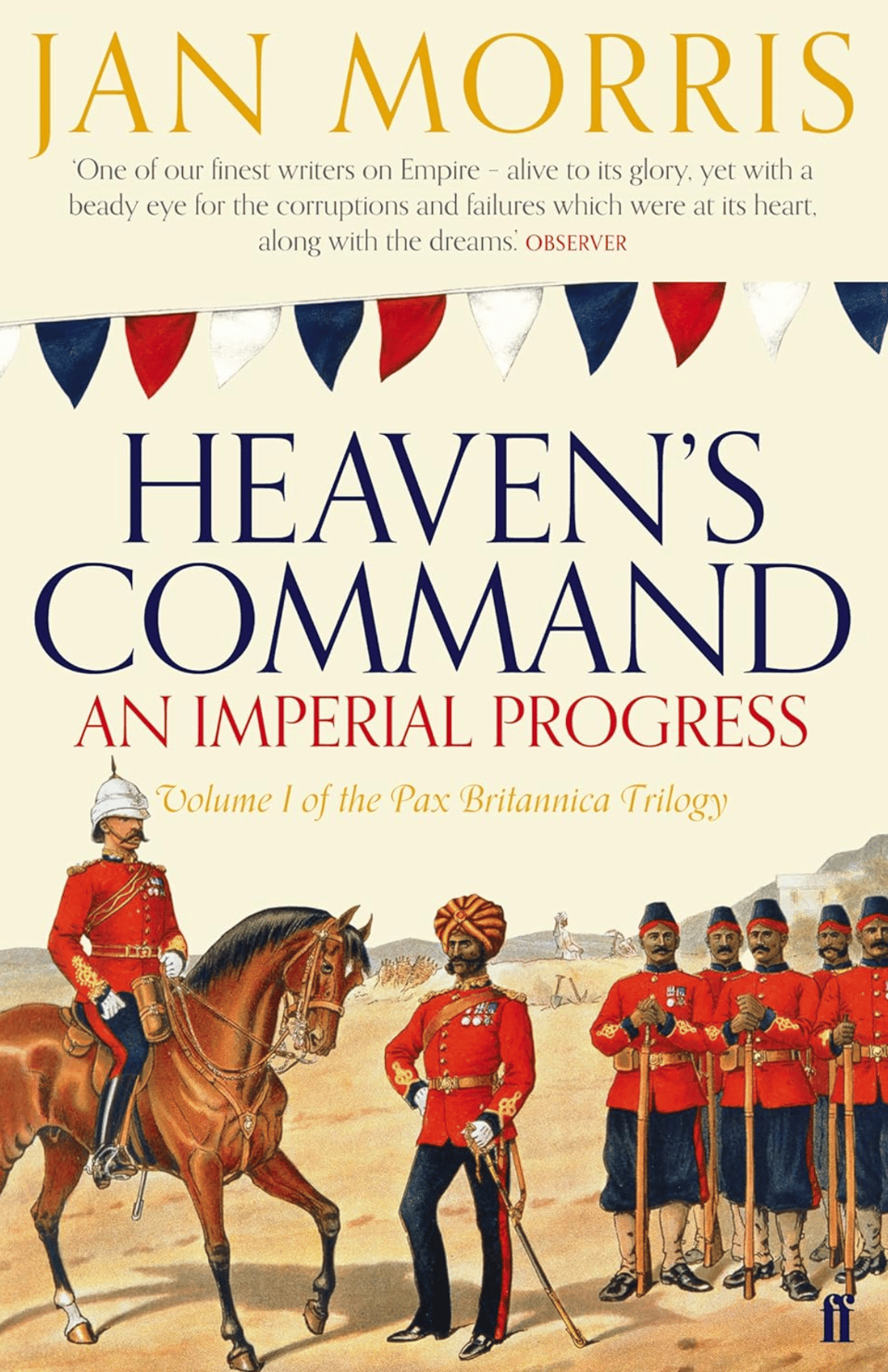
I think I've mentioned before that I have become an audiobook addict (I'd typically avoid that word, but I swear that when I'm coming to the end of a book, my desire to line up a new one is a bit extreme). I also curate a list of books that are good to fall asleep to--they can't be utterly awful (that would be aggravating), but they can't be too good or I'd get really involved with them and stay awake listening. When I came across audiobook versions of Jan Morris' "Pax Britannica" trilogy, about the rise and decline of the British Empire, I figured they would be good zzz-inducers. I knew her as a travel writer (and for her transition memoir, Conundrum, of course), but I was guessing she'd be fall-asleep-to tier as a writer of history. WOW, WAS I WRONG!
I've now listened to the first two books, Heaven's Command and Pax Britannica, and they are magical. The scope of expertise is absolutely astonishing; over the course of a page (I've just opened to one at random--happily I found a used copy in my local Oxfam bookstore), she ranges from India to South Africa to Canada, and her writing style is so vivid that I now plan to dip into Heaven's Command for inspiration whenever my own prose feels a bit dull.
Here's a--randomly selected; I just let the book fall open--paragraph:
Nobody knew the origins of malaria, yellow fever, typhus, cholera or typhoid--which was common in London itself, and presently killed the Prince Consort. Nobody indeed could distinguish malaria from yellow fever, and they were lumped together under the generic diagnosis Malignant Fever and variously thought to be contagious, to be induced by inebriation, to emanate from the effluvia of ships' bilges, or to strike indiscriminately out of the noxious tropical air. One well-known imperial hypochondriac, Judge Roger Yelverton of the Bahamas, insisted that malaria in Nassau was caused by the storage of coal for the Imperial Lighthouse Tender, and when an anonymous modernist called this nonsense in the columns of the Nassau Guardian, he imprisoned the newspaper's editor for refusing to reveal the writer's name.
(I won't reproduce the footnotes, but please know that there were two additional nuggets shared at the bottom of the page!)
Every paragraph is similarly stuffed with facts and observations. Morris seems to have put millions of details through a sieve and discarded all but the most fascinating as she was writing three 500-plus-page books. I am in awe.
I was particularly pleased when reviewers pointed out that A PLACE OF OUR OWN was the product of a ton of research. (It's self-indulgent, I know, but allow me to recall that the New York Times said, “Thomas doesn’t tap gently on the glass at these spaces; she flings herself in, starting (metaphorically) in their basements and working up. She scours accounting records, tax receipts and lawsuits going back decades. She reviews the minutes of softball league meetings. She tracks down the women who helped create places that transcended to spaces.”) Digging through archives, old magazines, and books is my favorite part of the writing process, but accessing and managing all that information is obviously massively easier these days than at any other point in time. I use Obsidian to manage all my notes and DevonThink to keep track of primary sources. I cannot imagine the organizational skills that Morris needed to keep track of all that information in the analog age--though I see her notebooks are at the National Library of Wales, and I'm genuinely tempted to try to find out.
These days there's a lot of interest in the note-taking techniques of writers and other creative people (I recommend Jillian Hess' Substack newsletter on the subject). I'm fascinated by the Zettelkasten and stacks of index cards and boxes of note cards writers variously use to keep track of ideas, but that's just the beginning. They then have to consult those notes over and over and--the really hard bit--write them up in a compelling way.
In recent weeks I've been listening to books about Sylvia Plath/Ted Hughes (Diane Middlebrook's Her Husband--what a title!) and the art of biography (Richard Holmes' This Long Pursuit), and both made extensive reference to notebooks, specifically Plath's journal, where she gestated the ideas and images that appeared in her poems and prose, and Holmes' habit of keeping a "two-sided notebook." On the right side, Holmes would "record the objective facts of my subject's life, as minutely and accurately as possible. ... But on the other (the left), I would also record my most personal responses, my feelings and speculations, my questions and conundrums, my difficulties and challenges, my travels and my visions." He makes a convincing case that this allowed him to build empathy with his subject, but I can't stop wondering how many notebooks Jan Morris would have used up if she had use this two-sided system for her epic trilogy!
UPCOMING EVENTS: I'm very excited for an event at Edinburgh's Lighthouse Bookshop on Wednesday, June 4, when I'll be appearing with Jane Cholmeley, one of the owners of London's Silver Moon Bookshop (1984-2001) and author of A Bookshop of One's Own. I'm also going to be visiting the Pacific Northwest in mid-October. I'll definitely be in Eugene, Oregon, and I very much hope to add stops in Portland and Seattle, but more on that once we figure it all out!
RECOMMENDATIONS: Daffodils. So yellow, so cheap, such a nice smell! (If we were in the same room, please know that I would be subjecting you to my recitation of Wordsworth's poem of the same name.)
Also, speaking of heaven's command, let's just recall the time Jamie Barton waved a massive rainbow flag while singing "Rule Britannia" at the Last Night of the Proms. (Here's my Studio 360 piece about Jamie!)
You just read issue #55 of Where Are All the Emails?. You can also browse the full archives of this newsletter.